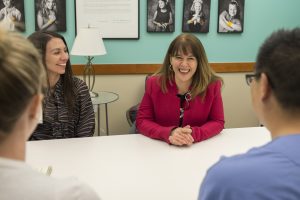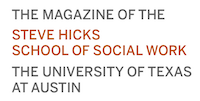
We have come a long way since the 1970s, when the word cancer was not spoken, and patients were not told their diagnosis because it was thought they would give up hope. There is now a firm trend in oncology towards putting the needs of patients and their families at the center and making them an active part of the healthcare team.
“We have recognized that we have to care for the whole person, which means we must attend to the medical as well as the psychosocial needs of the patient and the family through treatment and beyond,” says Barbara Jones, assistant dean for health affairs at the School of Social Work and an expert in psychosocial oncology. “We know that the mind and the body are linked, and that curing the disease in itself does not always give patients the quality of life they deserve. Even if the cancer is gone, if people remain traumatized and emotionally scarred, they are not fully healed.”
Locally, the trend towards holistic and patient-centered cancer care has been loud and clear in last fall’s announcement that The University of Texas at Austin and the LIVESTRONG Foundation will be launching the LIVESTRONG Cancer Institutes of the Dell Medical School. These institutes will create replicable and scalable models of care that are centered on the needs and lives of patients, and treat the whole person—emotionally, physically and practically.
“These are exciting times at UT Austin,” says Jones, who is helping to design the Dell Medical School’s interprofessional curriculum and has collaborated with LIVESTRONG for many years. “We have this unique opportunity to build a medical school from the ground up and to create innovative, patient-centered models of oncology care.”
“Collaboration is key to our success,” says Clay Johnston, dean of the Dell Medical School. “One of the key benefits of building a medical school from scratch on the foundation of a leading university like UT Austin is being able to tap into a wide range of superb resources, including experts in social work who are a critical component of improving health. Our team is very excited about the work we’re already doing with the UT School of Social Work and will continue to take advantage of creative opportunities for collaboration.”
Creative collaboration—with other health professionals, with patients and their families, with students and community organizations—has been at the heart of Jones’ two decades of experience in psychosocial oncology, all the way from direct practice to education to research and implementation.
A holistic approach to cancer care: From direct practice to educating other health professionals
Psychosocial oncology began formally in the mid-1970s, when new treatments for cancer were discovered, fear of the disease lessened, and the stigma attached to the word “cancer” diminished. Doctors, nurses, social workers and other health-related professionals also began to recognize that patients had psychological and social (psychosocial) needs in addition to medical needs.
“I started in pediatrics, as the social worker in the interdisciplinary oncology team, so for me it was quite obvious that we had to care not only for the child but also for the family, and that there were huge unmet psychosocial needs,” Jones recalls. “As social workers, this holistic approach comes quite naturally to us because of social work’s person-in-environment perspective. We understand an individual and his or her behavior in light of the environmental contexts — family, neighborhood, systems — in which that person lives and acts.”
Psychosocial oncology became better known to the wider public after the 2008 Institute of Medicine report, Cancer Care for the Whole Patient: Meeting Psychosocial Health Needs. This report showed evidence for psychosocial services such as counseling, self-care programs, caregiver education, and health promotion interventions. The report also stated that, despite this evidence, many individuals who could benefit from these services did not receive them.
“The Institute of Medicine report basically said that we could and should support patients and families better when they go through cancer treatment, and that there were many areas in need of improvement, such as distress screening, psychosocial care, family conferencing, institutional support for psychosocial services and empowering psychosocial providers to be leaders in their institutions,” Jones explains.
Partly in response to this call for action, in 2009 Jones developed the country’s first interprofessional graduate course in psychosocial oncology. The course prepared students in social work, nursing, psychology, public health, and other health-related disciplines to provide clinical services and conduct research in psychosocial oncology.
“The course is about learning the theories behind psychosocial oncology but more importantly, applying them to the real world,” says Farya Phillips, a postdoctoral fellow in psychosocial oncology at the School of Social Work who has been a teaching assistant for the course. “It gives students an overview of the resources available in the community for people affected by cancer, makes them think about the existing gaps, and challenges them to come up with meaningful projects and solutions to fill those gaps.”
More recently, Jones has taken her passion for educating oncology social workers to a national level, through the Excellence in Cancer Education and Leadership (ExCEL) program. ExCEL represents the first time that the National Cancer Institute has funded a social work team to develop national leadership in the field of psychosocial oncology. Since 2010, the program has trained over four hundred social workers from across the United States plus five other countries.
As one of the co-investigators of the ExCEL project team, Jones has been responsible for developing, directing, and delivering the ExCEL trainings, which focus on issues such as family conferencing and communication, distress screening and assessment, interdisciplinary teamwork, evidence-based interventions, and culturally sensitive practice.
“We went through great examples of how social workers in the treatment team work with the whole family. Discussing interdisciplinary teamwork, that is, how to work with nurses and doctors, was also very helpful,” says Caren Heilman, a pediatric oncology social worker at Dell Children’s Medical Center in Austin, and a participant in the first ExCEL training in May 2011.
In 2014, the American Psychosocial Oncology Society (APOS) recognized Jones and the other co-investigators of the ExCEL project by awarding them the 2014 APOS Outstanding Training and Education Award.
Building the evidence to support the practice
In recent years, psychosocial oncology has become a recognized field and research has demonstrated the impact of communication and clinical interventions on improving care and quality of life for patients and their families.
“We are at a point where everybody in the health care team, including patients, wants to know what is the evidence that says that a given psychosocial intervention will work,” Phillips says. “If they are going to invest six to ten weeks doing a specific intervention, they want to know what results they can expect.”
Jones has been researching the needs of adolescents and young adult survivors of cancer for many years. Currently, Jones and Phillips are studying a mindfulness meditation intervention for adolescents and young adults with cancer. They are also researching interventions to help empower young cancer survivors by giving them the skills to face common psychosocial issues, such as fear of relapse and fertility challenges.
“The focus on adolescents and young adults as a separate group is a recent development in psychosocial oncology. In part, it comes from the fact that survival rates have not improved for this population and they face unique developmental issues that impact their quality of life during treatment and into survivorship,” Jones says.
In psychosocial oncology, Jones explained, practice informs research and research informs practice in an integral and ongoing process that keeps patients and families at the center. For instance, Jones was recently conducting psychosocial research in Montana at Camp Make-a-Dream, a nonprofit that every summer welcomes children, teens, young adults, women and families affected by cancer.
“I was conducting a feasibility study of a mindfulness intervention that I had adapted on the basis of my clinical expertise and the existing research. I did the intervention with the adolescents and young adults at the camp, and they provided invaluable feedback to help us further refine the intervention. So our research is very practice-based and very patient-centered,” Jones says.
Giving back to the community
Because of her social work clinical background, Jones maintains a community –oriented approach to psychosocial oncology research, education, and practice. Throughout her career, she has volunteered and held leadership positions in numerous organizations that provide care and support to people affected by cancer and their families, in Austin and across the nation.
“As a long term collaborator with Barbara, we feel very fortunate to have a national renowned leader in the cancer community and the field of social work to provide her insight and expertise to help us improve the lives of people affected by cancer—and we’re all able to do that right here in Austin,” says Emily Eargle, an alumna of the School of Social Work and the director of navigation services at the LIVESTRONG Foundation.
Jones has been engaged with the Foundation for more than 10 years. She has been an advisor on key projects such as the LIVESTRONG Survivorship Center of Excellence Network, a unique partnership of 7 National Cancer Institute-designated comprehensive cancer centers to improve outcomes for post-treatment cancer survivors, and the LIVESTRONG Young Alliance, a partnership of key stakeholders focused on an often overlooked populations of those diagnosed between 15 and 39 years of age. Jones has also conducted assessments of the LIVESTRONG Navigation program, to help them understand national priorities and key gap areas to support people throughout the cancer continuum. Most recently, Jones has moderated a panel of patients and survivors at the LIVESTRONG Symposium on patient-centered cancer care.
“We’re pleased to have recently announced our partnership with Dell Medical School at UT Austin to launch the LIVESTRONG Cancer Institutes,” says Ruth Rechis, vice president for programs & strategy at LIVESTRONG. “We will use the knowledge we have built over the last eighteen years in partnership with the community and key individuals like Barbara to change the ecosystem of cancer care and create patient-centered models that will start in Austin and spread throughout the world.”
“With the creation of the LIVESTRONG Cancer Institutes at the Dell Medical School we have a unique opportunity to build patient-centered oncology care from the ground up, with patients helping us decide what is critical to the delivery of their care,” Jones concludes. “I am inspired by the chance we have to improve the lives of cancer patients and families and to truly transform oncology care.”
By Andrea Campetella. Photos by Miguel Gutierrez Jr.
